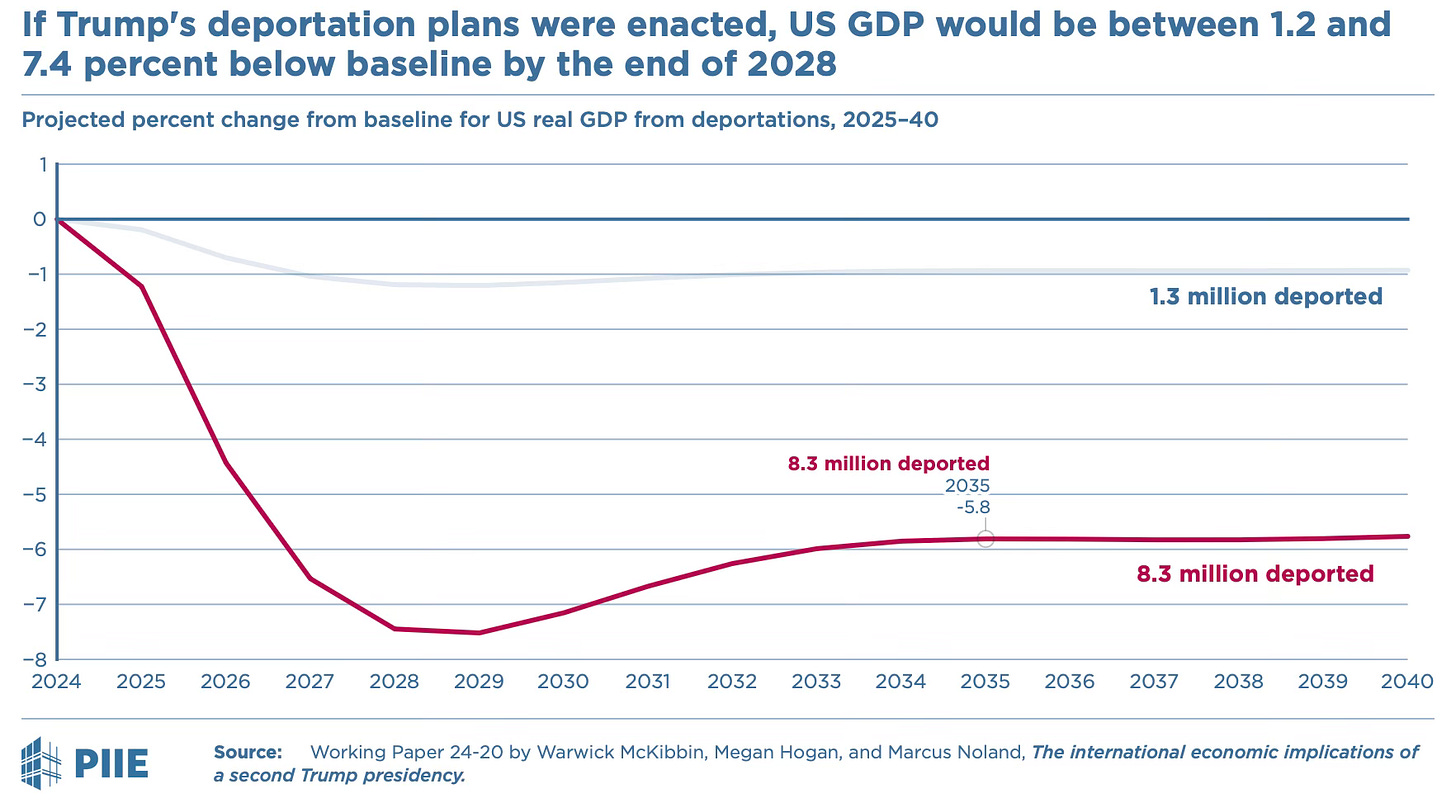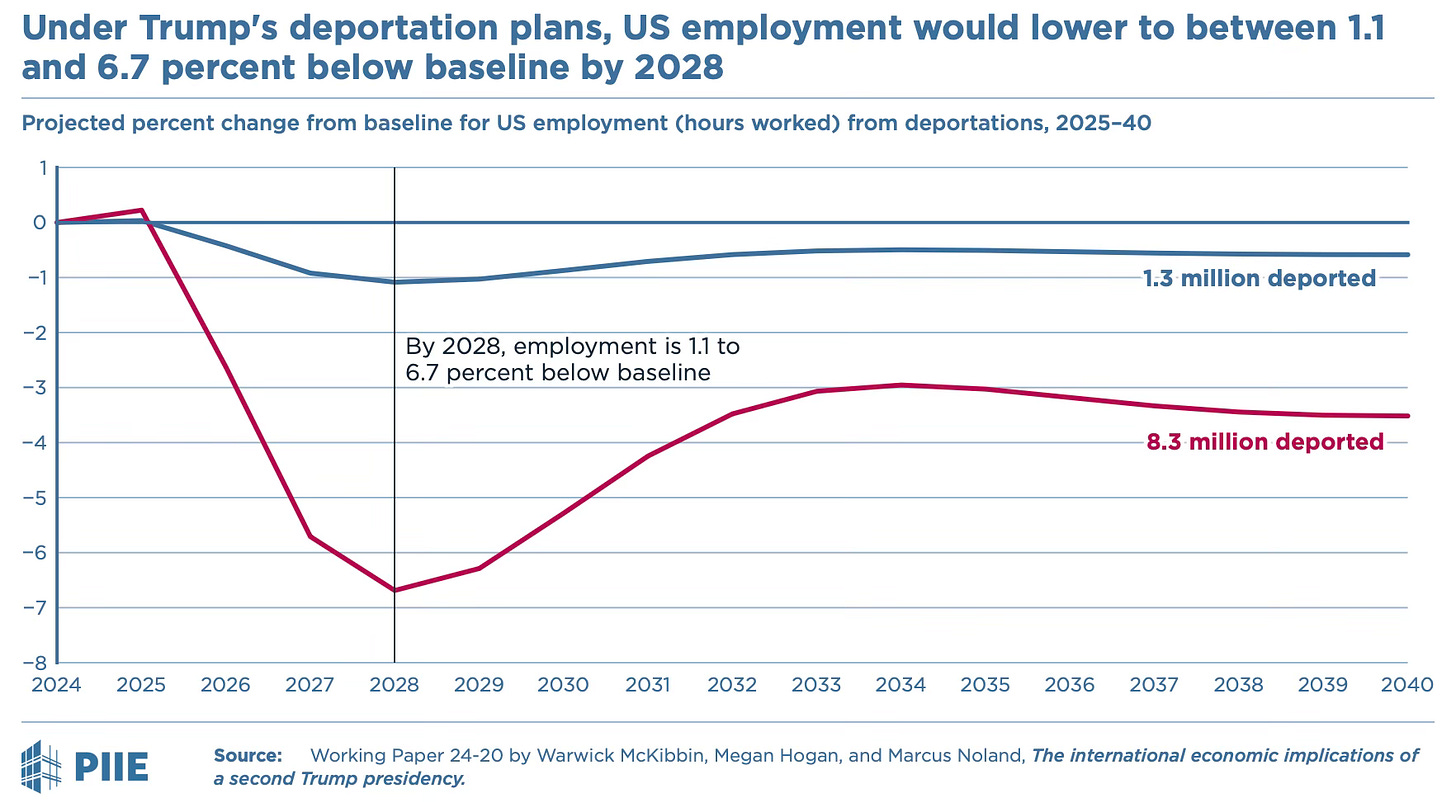Mass Deportation: America's $6T Mistake
Shorting the economy: the math FAIR won’t show you.
The next time someone tells you mass deportation is a fiscal necessity, ask them if they also enjoy setting piles of money on fire during thunderstorms. It’s essentially the same policy.
Some political fantasies are quaint. Others are ruinous. This one sits squarely in the second camp—polished with patriotic flair, sold to voters as a bold reclamation of order, and wrapped in the delusion that economic gravity doesn’t apply to red hats. But numbers? Numbers don’t care.
Let's get uncomfortable.
The notion that deporting 11 to 15 million undocumented immigrants would save America money is the fiscal equivalent of believing you can cure a headache with a guillotine. It's not just wrong—it's violently backwards.
At the core of the illusion is a "study" from FAIR (Federation for American Immigration Reform), a group whose acronym feels like a cosmic joke. They claim undocumented immigrants cost the U.S. $182 billion a year and pay only $32 billion in taxes, yielding a tidy $150 billion annual loss. Except... not. Their model includes U.S.-born children as "costs" and erases the taxes they'll pay in their lifetimes. That's like counting your heirs as liabilities on your balance sheet while ignoring your estate's growth. It's Enron with a flag.
Take FAIR's numbers and throw them into an actual economic model—and suddenly their $150 billion "burden" shrinks by up to 97%.
But here's where it gets hilarious if it weren't tragic: even if we accept their warped figures, the cost of executing their fantasy would still eclipse the imagined savings. The real math tells a brutal story.
Deporting 15 million people? You're looking at a $265 billion upfront price tag just to get the buses rolling. Then $88 billion per year to keep the engine humming. Add indirect costs and lost tax revenue, and the bill floats past $6 trillion like a drunk balloon.
The labor force would bleed. Construction, agriculture, hospitality—entire sectors would crater. About 14% of construction workers are undocumented. Same for farming. Manufacturing too. Lose them, and you don't magically get a line of Americans eager to pick strawberries for $12 an hour in Bakersfield heat. You get rotting fields and idle machines.
And inflation? It would eat your paycheck alive. As labor vanishes, prices surge. Food, housing, services—all climbing. The Peterson Institute estimates deportation-triggered inflation would run hot for three years. Think supply shock meets demand collapse. Now add political chaos.
The GDP hit? Between $1.1 and $1.7 trillion. Annually. Let that settle in.
You know what shrank GDP by 4.3%? The Great Recession.
This would be worse.
The Peterson Institute ran the numbers using scenario modeling. Their projection shows how mass deportation doesn't just dent GDP—it shaves off a full recession's worth of growth and keeps it suppressed for years.
It's also the kind of policy that would spook capital markets into full-blown revolt. If the U.S. spends trillions to remove a productive population while gutting domestic consumption, guess what happens? The dollar stumbles. Bonds sink. Investors flee. Credit tightens. You don't even need to get to the morality of it—it's just dumb economics.
But here's the kicker: it wouldn't even work on its own terms.
Even if you believe the FAIR math, you spend $265 billion upfront plus $88 billion annually... to maybe save $150 billion per year? That's a negative ROI in year one. By year five, you're digging out of a fiscal crater the size of the Mariana Trench.
You'd also have to expand ICE into something resembling a militarized domestic force, build hundreds of detention centers, and somehow ignore the legal, ethical, and geopolitical fallout. Good luck explaining to global creditors that America's new growth strategy is chasing fruit pickers out of Oklahoma with drones.
The employment story isn't any brighter. Deporting millions doesn't free up jobs for Americans—it wipes out demand and drains labor pipelines in industries that keep the economy running. The data shows exactly how quickly the floor gives way:
By 2028, the U.S. would be short the equivalent of millions of full-time jobs. Recovery is slow, uneven, and never fully reaches baseline.
Rome didn't fall in a day. But it did fall because it let ideology override economics. So did Japan—its decades of stagnation partially rooted in a refusal to allow productive immigrants to offset its demographic decay.
The U.S. isn't immune.
And the cruelest irony? The working-class Americans this policy purports to protect would be hit hardest. Fewer jobs. Higher prices. Collapsing services. It's the Rust Belt's opioid sequel, this time starring economic isolationism and a trillion-dollar burn rate.
Markets have a funny way of responding to ideological delusion: they exit stage left. Quietly. Then all at once.
Immigration needs reform, no question. But mass deportation as a strategy is like burning down your house to fix a leaky pipe. What's left is ash, smoke, and a bill you'll never repay.
Anyone selling this idea isn't saving America. They're shorting it—and betting that voters won't notice until the bill comes due.




